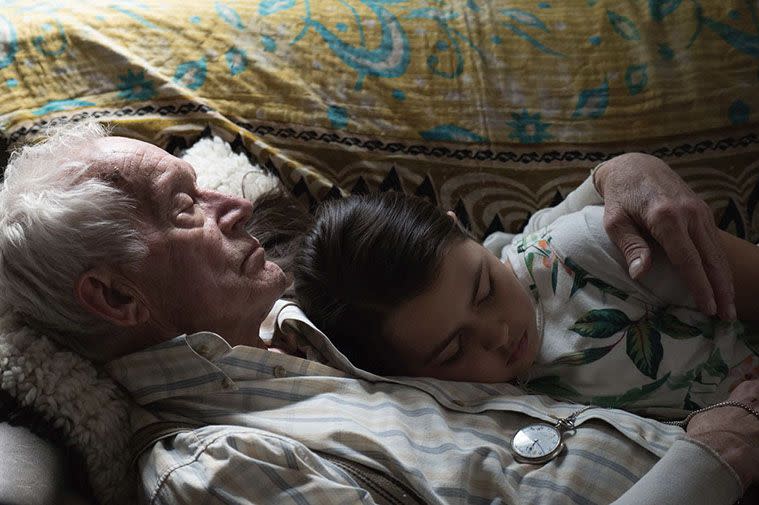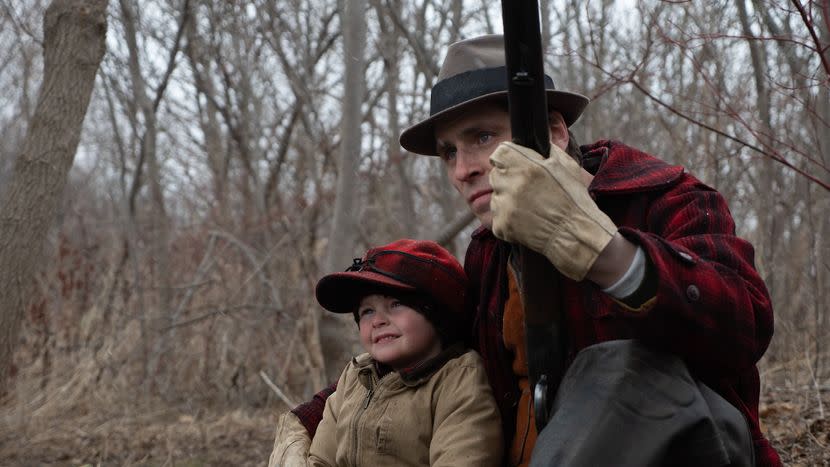Lord of the Rings star Viggo Mortensen on his emotional new movie Falling

When you sit down to watch Falling, Viggo Mortensen's directorial debut, you're instantly enveloped in something wholly atmospheric. Yes, the story is about a man dealing with his father's dementia but this is more than just the plot — it informs everything about the film, from its music (which Mortensen scored) to its dream-like, non-linear structure.
For anyone watching who has experienced a loved one dealing with dementia, like your writer here, when the movie starts it's hard not to take a deep, steeling breath — one you don't let it out until the film finishes. It's a hard tension to keep without exhausting the viewer, but it's exactly what this kind of experience is like. There is no exhale.
The story is informed by Mortensen's own experiences dealing with his parents' illnesses, and his particular view of how dementia addles the brain. "You know, in watching movies that have been made about this, and plays as well, where there's some aspect of dementia or Alzheimer's dealt with, I always felt that there was something that even in the best of them, it wasn't quite what I had experienced, in the sense that they were showing people who were confused, basically," Mortensen says.
"When they sometimes attempted to show the point of view of that person, it was the point of view of a confused person – generally, most of the time. But in my experience with it, it's that they're not.
"The people confused are those observing, generally." It's a familiar experience; there was a time my father tried to make tomato sauce with everything red in our refrigerator, from raspberries to ketchup. "In that situation," Viggo replies, "as you're learning, how to — how do you communicate?

"It's a game that moves all the time as you're playing it. So what do you do in that situation? Do you agree with them? Are you able to step back and go, 'OK, he's not hurting anyone. Let him do it.' Or correct him. And then that does confuse or upset them."
These endless questions are not the preoccupation of the film's main character, John, though. He's just trying to make the already strained father-son relationship work.
And on the other side of said relationship is Lance Henriksen as John's father Willis, a homophobic, racist, misogynist already filled with disdain for modern societal norms. To prepare, though, Henriksen says he "didn't read a lot of books on dementia".
"I had already seen it. I had seen the life expectancy of my own grandfather, and what started to happen to him. I came from a very kind of chaotic, destructive childhood. So it threw me into dementia. I didn't know if I was coming or going, or what life was supposed to be, or what it was like, or anything.
"So I was always struggling for some kind of clarity. And in a way, I was a natural to do this, because I didn't feel like dementia was something that was abusing you. I just felt that the people around him – [or around] anyone with dementia – were maybe thoughtless a lot of the time, and didn't know what to do.
"With Viggo's guidance on this thing and that beautiful script that he had written, I was not afraid to take it on. I wasn't secure in it. It wasn't good for me to be secure anyway."

There's a bizarre dichotomy watching Falling — as a viewer, it's almost impossible not to be riled up with white-hot indignation as Willis spouts profanities, racial abuse, homophobic tirades, and calls both of his ex-wives whores. What makes it uncanny is the evenness with which his family react — not only are they used to it, but they blame part of his explosiveness on his dementia.
It's a tension that works if you can stomach it. If not, there's always the option to fast forward, which, if done, won't undermine the film as a whole, it just lessens the sting.
Henriksen is aware of everything he says, and the pain those words inflict. "Talking about my wives, that was the hardest. Because it was like hitting a child. I'm not talking about Viggo," he clarifies. It's a broader, metaphorical point. Taking aim at the innocent, the dead, those who loved you and you loved in return.

"How do you talk to somebody about an intimate relationship that went awry? And in the condition I was in, I just couldn't do it any other way," he describes of the character.
Dementia is cruel, we all know this — it is a disease that ripples across everyone who comes into contact with it. How do you explore that through the 2D medium of film?
For Mortensen, it wasn't a limitation but an opportunity. "With filmmaking, you have a lot of tools at your disposal. You have, hopefully, a great actor who gives you a wonderful performance like Lance has, with lots of layers, and going in and out of mental states, and the way he listens, or understands, or interprets things differently than others do – you know, the present.
"But you also have image and sound – all these tools that you can use, like where sound is placed, and how it's used, and maybe exclusively sound as a way of showing where that person is coming from. And I think we succeeded, and Lance helped us in showing someone who is not confused. It's just, their present is different from yours.
"If we agree that memory is really more a collection of feelings that evolve all the time than it is a collection of facts, then why is that person's present, and perception of things, and what they hear and see and feel, any less valid than yours? These are some of the things that we were trying to get at.
"And I think that we succeeded, in large part thanks to what Lance gave us to work with."
Everyone will have to make up their own mind as to whether or not Mortensen succeeded in his endeavour, but as a viewer with their own experiences of caring for, and loving, someone with dementia, it certainly felt like a success.
Falling is out in cinemas on December 4
Digital Spy has launched its first-ever digital magazine with exclusive features, interviews, and videos. Access the latest edition with a 1-month free trial, only on Apple News+.
Interested in Digital Spy's weekly newsletter? Sign up to get it sent straight to your inbox – and don't forget to join our Watch This Facebook Group for daily TV recommendations and discussions with other readers.
You Might Also Like

 Yahoo Movies
Yahoo Movies 